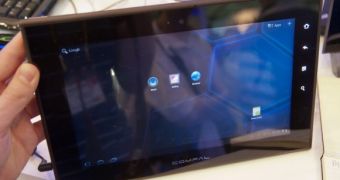Even though Intel outlined some very ambitious plans for the tablet and smartphone markets, it might just be that it still has quite some work to do before its processors can really run the Android OS effectively.
It is already well known that the ARM architecture currently holds the highest stake as far as tablet hardware goes, while the Google Android OS has the same position on the software front.
Intel, of course, wants its Atom series of x86 processors, and future SoCs (system-on-chip devices) to somehow give it a firm hold over this field.
The fact that its CPUs support the Android OS definitely helps, but it might just be that the Santa Clara, California-based company still has some work to do.
The folks over at Tweakers conducted some performance tests on a certain prototype Compal tablet equipped with the 1.5 GHz dual-core Atom Z670.
Turns out that the score of 1,562 (Java performance) was seriously overshadowed by the 7,194 and 7,197 of the Samsung Galaxy Tab 10.1 and Acer Iconia Tab A500, both of which use the ARM-based NVIDIA Tegra 2 SoC.
Also, in Linpack, the results were even more underwhelming, with the score of 9.4 MFLOPS being outclassed clearly by the 42.2 MFLOPs of the ASUS Eee Pad Transformer.
The only instance where the Oak Trail slate won was the SunSpider browser speed test, where 1,500ms beat the 1,888ms of the ASUS Transformer.
Of course, users should be careful not to use these results as guidelines when buying a tablet, simply because, being an early prototype tablet, there was probably no sort of driver or application optimization done, not to mention that drivers for the hardware on the inside probably don't even exist yet, at least not in a final form.
Either way, there is no question that things will improve before the first Android-loaded Oak Trail tablets arrive in stores later this year.

 14 DAY TRIAL //
14 DAY TRIAL //